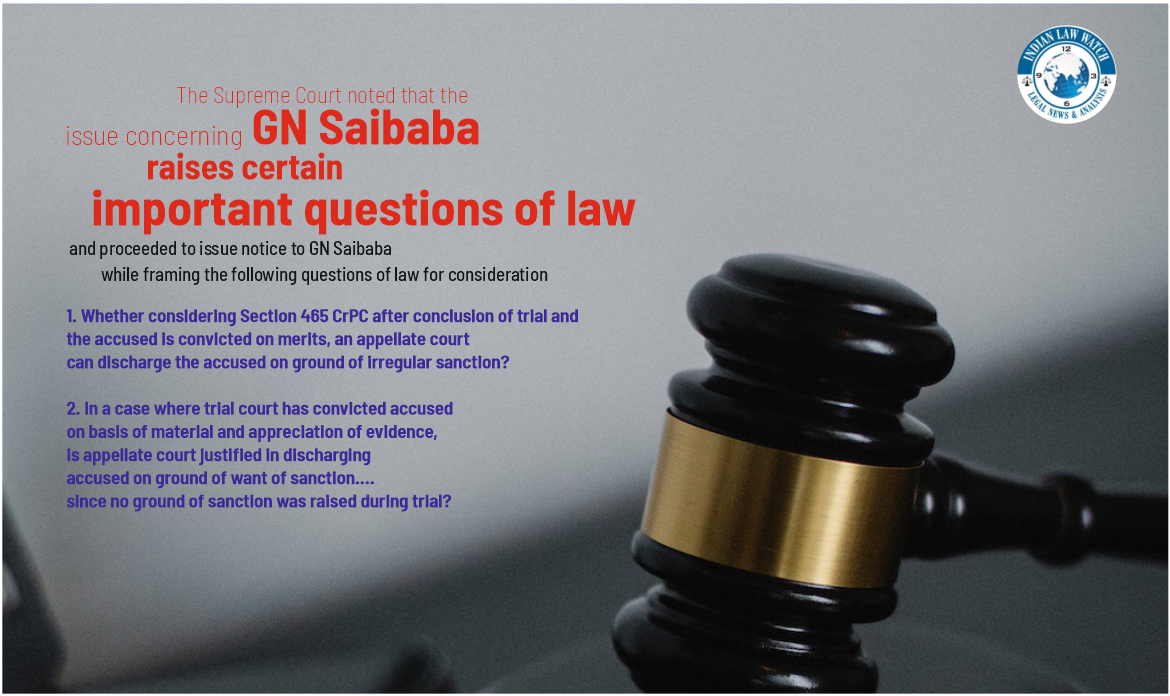

The Supreme Court, in a special sitting, on Saturday, suspended the decision of the Nagpur Bench of the Bombay High Court acquitting former Delhi University professor GN Saibaba and others in an alleged Maoist links case.
The Supreme Court also rejected Saibaba’s request to keep him under house arrest due to his disability and posted the case to December 8, saying he can move for a bail petition.

“We are of the opinion that it is a fit case to exercise power under 390 of Code of Criminal Procedure and suspend the order of the High Court….the medical grounds of the accused was presented and rejected by the High Court during a bail plea earlier. Thus, High Court order stands suspended. Issue notice,” said the Bench of Justices MR Shah and Bela M Trivedi.
The bench said, “We are not referring to this case but in general. The brain is the most dangerous thing. For terrorists or Maoists, the brain is everything.”


-
Solicitor General Tushar Mehta, appearing for the Maharashtra Government, strongly objected to the request of keeping Saibaba under house arrest. “There is a recent tendency from urban naxals to seek house arrests. But everything can be done from within the home for them. Even by phone. Please say that house arrest can never be an option,” said the SG vehemently opposing the demand.
-
Mehta claimed there were certain disturbing facts in the case and Saibaba was involved in various activities, including an armed separatist movement in Jammu and Kashmir, waging war against the democratic setup of the country and arranging meetings of Maoist commanders. “He was their brain and used to propagate their ideology,” Mehta said.
-
The SC said the HC did not consider the case on merits but acquitted the accused due to lack of sanction of the Government required under Section 45 of the Unlawful Activities Prevention Act.
-
“This court is of prima facie opinion that a detailed scrutiny is required with regard to the impugned judgment since High Court has not considered the merits of the case, including the gravity of the offence alleged against him,” the order said
-
Apart from Saibaba, the Bombay HC had acquitted Mahesh Kariman Tirki, Pandu Pora Narote (both farmers), Hem Keshavdatta Mishra (student) and Prashant Sanglikar (journalist), who were sentenced to life imprisonment, and Vijay Tirki (labourer), who was sentenced to 10 years in jail. Narote died during the appeal’s pendency.
-
The Court further opined that the accused were convicted after detailed appreciation of evidence. “Offences are very serious and if the State succeeds on merits, offences are very serious against the interest of the society, sovereignty and integrity of India. High Court order is based on no sanction,” the bench opined.
-
The top court noted that the issue raises certain important questions of law and proceeded to issue notice to GN Saibaba while framing the following questions of law for consideration: 1. Whether considering Section 465 CrPC after conclusion of trial and the accused is convicted on merits, an appellate court can discharge the accused on ground of irregular sanction? 2. In a case where trial court has convicted accused on basis of material and appreciation of evidence, is appellate court justified in discharging accused on ground of want of sanction…. since no ground of sanction was raised during trial?
The Bombay High Court bench of Justices Rohit Deo and Anil Pansare had allowed the appeal filed by Saibaba challenging a 2017 decision of the trial court convicting and sentencing him to life imprisonment based on the fact that the Sessions Court framed charges against Saibaba in the absence of sanction from the Central Government under Section 45(1) of the Unlawful Activities (Prevention) Act (UAPA).
During the hearing before the apex court on Saturday, SG Mehta said that mere inadequacy of sanction will not vitiate the trial. “Sanction is to ensure the accused is not subject to vexatious trial. This is not a vexatious investigation. If full-fledged trial takes place, then there is no question of sanction, and thus comes Section 465 of Code of Criminal Procedure (CrPC),” the SG said.
Source : Daily Pioneer





